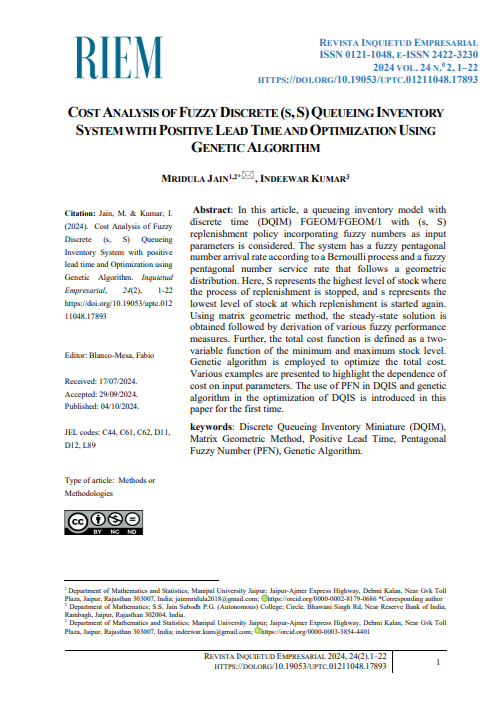Análisis de costos de un sistema de inventario en colas difusas discretas (s, S) con tiempo de entrega positivo y optimización mediante algoritmos genéticos

Resumen
En este artículo se presenta un modelo de inventario en colas con tiempo discreto (DQIM) FGEOM/FGEOM/1 utilizando una política de reabastecimiento (s, S) e incorporando números difusos como parámetros de entrada. El sistema considera una tasa de llegada con un número pentagonal difuso siguiendo un proceso de Bernoulli y una tasa de servicio pentagonal difusa con distribución geométrica. S representa el nivel máximo de inventario en el que se detiene el proceso de reabastecimiento, mientras que s indica el nivel mínimo de inventario a partir del cual se reanuda el reabastecimiento. Empleando el método geométrico matricial, se obtiene la solución en estado estacionario, seguida de la derivación de varias medidas de desempeño difusas. Posteriormente, se define la función de costo total como una función de dos variables que depende del nivel de inventario mínimo y máximo. Se utiliza un algoritmo genético para optimizar el costo total. Se presentan varios ejemplos para destacar la dependencia del costo respecto a los parámetros de entrada. En este trabajo, se introduce por primera vez el uso de números pentagonales difusos (PFN) en el sistema de inventario en colas discretas (DQIS) y la optimización de DQIS mediante algoritmos genéticos.
Códigos JEL: C44, C61, C62, D11, D12, L89
Recibido: 17/07/2024. Aceptado: 29/09/2024. Publicado: 04/10/24.
Palabras clave
Sistema de inventario con colas discretas en miniatura (DQIM), , método geométrico matricial, tiempo de entrega positivo, número difuso pentagonal (PFN), algoritmo genético
Citas
- Abdali, N., Heidari, S., Alipour-Vaezi, M., Jolai, F., & Aghsami, A. (2024). A priority queueing-inventory approach for inventory management in multi-channel service retailing using machine learning algorithms. Kybernetes. https://doi.org/10.1108/K-07-2023-1281 DOI: https://doi.org/10.1108/K-07-2023-1281
- Akar, N., & Dogan, O. (2021). Discrete-time queueing model of age of information with multiple information sources. IEEE Internet of Things Journal, 8(19), 14531–14542. https://doi.org/10.1109/JIOT.2021.3053768 DOI: https://doi.org/10.1109/JIOT.2021.3053768
- Anilkumar, M. P., & Jose, K. P. (2022). Analysis is a discrete time queueing-inventory model with back-order of items. 3C Empresa. Investigación y Pensamiento Crítico, 11(02), 50–62. https://doi.org/10.17993/3cemp.2022.110250.50-62 DOI: https://doi.org/10.17993/3cemp.2022.110250.50-62
- Atencia, I. (2015). A discrete-time queueing system with server breakdowns and changes in the repair times. Annals of Operations Research, 235(1), 37–49. https://doi.org/10.1007/s10479-015-1940-3 DOI: https://doi.org/10.1007/s10479-015-1940-3
- Atencia, I. (2017). A Geo/G/1 retrial queueing system with priority services. European Journal of Operational Research, 256(1), 178–186. https://doi.org/10.1016/j.ejor.2016.07.011 DOI: https://doi.org/10.1016/j.ejor.2016.07.011
- Balagopal, N., Deepthy, C., Jayaprasad, P., & Varghese, J. (2021). Comparison of discrete time inventory systems with positive service time and lead time. Korean Journal of Mathematics, 29(2), 371–386. https://doi.org/10.11568/KJM.2021.29.2.371
- Balagopal, N., Deepthy, C., Jayaprasad, P., & Varghese, J. (2020). Discrete time queueing inventory models with inventory dependent customer arrival under (s; s). Neural, Parallel, & Scientific Computations, 28(1), 13-26. https://doi.org/10.46719/npsc20202813 DOI: https://doi.org/10.46719/npsc20202813
- Jeganathan, K., Harikrishnan, T., Lakshmi, K. P., & Nagarajan, D. (2023). A multi-server retrial queueing-inventory system with asynchronous multiple vacations. Decision. Analytics Journal, 9, 100333. https://doi.org/10.1016/j.dajour.2023.100333 DOI: https://doi.org/10.1016/j.dajour.2023.100333
- Jain, M., & Jain, A. (2021). Computing and analysis of multi-server queueing model using pentagonal fuzzy numbers. IOP Conference Series: Materials Science and Engineering, 1099(1), 012006. https://doi.org/10.1088/1757-899X/1099/1/012006 DOI: https://doi.org/10.1088/1757-899X/1099/1/012006
- Jain, M., & Jain, A. (2022). Genetic algorithm in retrial queueing system with server breakdown and caller intolerance with voluntary service. International Journal of System Assurance Engineering and Management, 13(2), 582–598. https://doi.org/10.1007/s13198-021-01364-9 DOI: https://doi.org/10.1007/s13198-021-01364-9
- Ke, J.-B., Ke, J.-C., & Lin, C.-H. (2010). Cost optimization of an M/M/r queueing system with queue-dependent servers: Genetic algorithm. In: QTNA '10: Proceedings of the 5th International Conference on Queueing Theory and Network Applications (pp. 82–86). https://doi.org/10.1145/1837856.1837869 DOI: https://doi.org/10.1145/1837856.1837869
- Kempa, W. M., & Paprocka, I. (2024). A Discrete-Time Queueing Model of a Bottleneck with an Energy-Saving Mechanism Based on Setup and Shutdown Times. Symmetry, 16(1), 63. https://doi.org/10.3390/sym16010063 DOI: https://doi.org/10.3390/sym16010063
- Krishnamoorthy, A., Chakravarthy, S. R., Melikov, A., & Narayanan, V. C. (2024). Queueing-inventory: Analytical and simulation modeling and classical and retrial queues and inventory. Annals of Operations Research, 340(2–3), 1221–1224. https://doi.org/10.1007/s10479-024-06015-3 DOI: https://doi.org/10.1007/s10479-024-06015-3
- Lan, S., & Tang, Y. (2017). Performance analysis of a discrete-time queue with working breakdowns and searching for the optimum service rate in working breakdown period. Journal of Systems Science and Information, 5(2), 176–192. https://doi.org/10.21078/JSSI-2017-176-17 DOI: https://doi.org/10.21078/JSSI-2017-176-17
- Narayanamoorthy, S., & Ramya, L. (2017). Multi server fuzzy queuing model using DSW algorithm with hexagonal fuzzy number. International Journal of Pure and Applied Mathematics, 117(11), 385-392.
- Visalakshi, V., & Suvitha, V. (2018). Performance measure of fuzzy queue using pentagonal fuzzy numbers. Journal of Physics: Conference Series, 1000, 012015. https://doi.org/10.1088/1742-6596/1000/1/012015 DOI: https://doi.org/10.1088/1742-6596/1000/1/012015
- Xu, Y., Li, K., Hu, J., & Li, K. (2014). A genetic algorithm for task scheduling on heterogeneous computing systems using multiple priority queues. Information Sciences, 270, 255–287. https://doi.org/10.1016/j.ins.2014.02.122 DOI: https://doi.org/10.1016/j.ins.2014.02.122
- Zhou, S., Liu, L., & Li, J. (2015). A discrete-time queue with preferred customers and partial buffer sharing. Mathematical Problems in Engineering, 2015, 1–12. https://doi.org/10.1155/2015/173938 DOI: https://doi.org/10.1155/2015/173938
